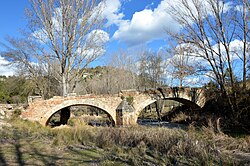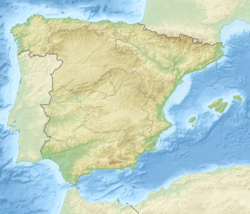
Colombia, officially the Republic of Colombia, is a country in South America with an insular region in North America. It is bordered by the Caribbean Sea to the north, Venezuela to the east, Brazil to the southeast, Ecuador and Peru to the south, the Pacific Ocean to the west and Panama to the northwest. Colombia comprises 32 departments and the Capital District of Bogotá, the country's largest city. It covers an area of 1,141,748 square kilometers (440,831 sq mi), with a population of 50 million. Colombia's cultural heritage reflects influences by various Amerindian civilizations, European settlement, enslaved Africans, as well as immigration from Europe and the Middle East. Spanish is the nation's official language, besides which over 70 languages are spoken.

Christopher Columbus was an Italian explorer and navigator who completed four Spanish-based voyages across the Atlantic Ocean sponsored by the Catholic Monarchs of Spain, opening the way for the widespread European exploration and colonization of the Americas. His expeditions were the first known European contact with the Caribbean, Central America, and South America.

Francisco Franco Bahamonde was a Spanish general who led the Nationalist forces in overthrowing the Second Spanish Republic during the Spanish Civil War and thereafter ruled over Spain from 1939 to 1975 as a dictator, assuming the title Caudillo. This period in Spanish history, from the Nationalist victory to Franco's death, is commonly known as Francoist Spain or as the Francoist dictatorship.

Puerto Rico, officially the Commonwealth of Puerto Rico, is a Caribbean island and unincorporated territory of the United States. It is located in the northeast Caribbean Sea, approximately 1,000 miles (1,600 km) southeast of Miami, Florida, between the Dominican Republic and the U.S. Virgin Islands, and includes the eponymous main island and several smaller islands, such as Mona, Culebra, and Vieques. It has roughly 3.2 million residents, and its capital and most populous city is San Juan. Spanish and English are the official languages of the executive branch of government, though Spanish predominates.

Real Madrid Club de Fútbol, commonly referred to as Real Madrid, is a Spanish professional football club based in Madrid.

Spain, or the Kingdom of Spain, is a transcontinental country predominantly located in southwestern Europe with parts of territory in the Atlantic Ocean and across the Mediterranean Sea. The largest part of Spain is situated on the Iberian Peninsula; its territory also includes the Canary Islands in the Atlantic Ocean, the Balearic Islands in the Mediterranean Sea, and the autonomous cities of Ceuta and Melilla in Africa. The country's mainland is bordered to the south by Gibraltar; to the south and east by the Mediterranean Sea; to the north by France, Andorra and the Bay of Biscay; and to the west by Portugal and the Atlantic Ocean. With an area of 505,990 km2 (195,360 sq mi), Spain is the second-largest country in the European Union (EU) and, with a population exceeding 47.4 million, the fourth-most populous EU member state. Spain's capital and largest city is Madrid; other major urban areas include Barcelona, Valencia, Seville, Zaragoza, Málaga, Murcia, Palma de Mallorca, Las Palmas de Gran Canaria and Bilbao.
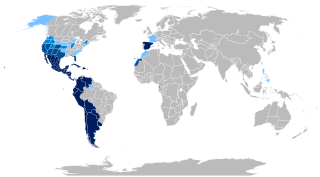
Spanish is a Romance language of the Indo-European language family that evolved from colloquial Latin spoken in the Iberian Peninsula of Europe. Today, it is a global language with more than 500 million native speakers, mainly in the Americas and Spain. Spanish is the official language of 20 countries. It is the world's second-most spoken native language after Mandarin Chinese; the world's fourth-most spoken language overall after English, Mandarin Chinese, and Hindustani (Hindi-Urdu); and the world's most widely spoken Romance language. The largest population of native speakers is in Mexico.

The Spanish–American War was a period of armed conflict between Spain and the United States. Hostilities began in the aftermath of the internal explosion of USS Maine in Havana Harbor in Cuba, leading to United States intervention in the Cuban War of Independence. The war led to the United States emerging predominant in the Caribbean region, and resulted in U.S. acquisition of Spain's Pacific possessions. It led to United States involvement in the Philippine Revolution and later to the Philippine–American War.

The Campeonato Nacional de Liga de Primera División, commonly known simply as Primera División in Spain, and as La Liga in English-speaking countries and officially as LaLiga Santander for sponsorship reasons, stylized as LaLiga, is the men's top professional football division of the Spanish football league system. Administered by the Liga Nacional de Fútbol Profesional, it is contested by 20 teams, with the three lowest-placed teams at the end of each season being relegated to the Segunda División and replaced by the top two teams and a play-off winner in that division.

Philip II, also known as Philip the Prudent, was King of Spain from 1556, King of Portugal from 1580, and King of Naples and Sicily from 1554 until his death in 1598. He was also jure uxoris King of England and Ireland from his marriage to Queen Mary I in 1554 until her death in 1558. He was also Duke of Milan from 1540. From 1555, he was Lord of the Seventeen Provinces of the Netherlands.

Futbol Club Barcelona, commonly referred to as Barcelona and colloquially known as Barça, is a professional football club based in Barcelona, Catalonia, Spain, that competes in La Liga, the top flight of Spanish football.

The Spanish Empire, also known as the Hispanic Monarchy or the Catholic Monarchy was a colonial empire governed by Spain and its predecessor states between 1492 and 1976. One of the largest empires in history, it was, in conjunction with the Portuguese Empire, the first to usher the European Age of Discovery and achieve a global scale, controlling vast portions of the Americas, territories in Western Europe, Africa, and various islands in Oceania and Asia. It was one of the most powerful empires of the early modern period, becoming the first empire known as "the empire on which the sun never sets", and reached its maximum extent in the 18th century.
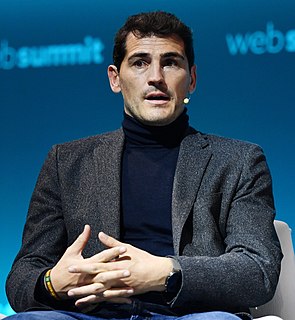
Iker Casillas Fernández is a Spanish former professional footballer who played as a goalkeeper. Popularly dubbed "San Iker" for his ability to produce spectacular saves, Casillas is widely considered to be one of the greatest goalkeepers of all time. He is known for his athleticism, quick reactions and outstanding shot-stopping ability. Having spent the majority of his career at Real Madrid, Casillas is one of the few players to achieve over 1000 professional career matches, and holds the record for the most clean sheets in the UEFA Champions League, as well as for the Spain national team.

The Spain national football team has represented Spain in international men's football competitions since 1920. It is governed by the Royal Spanish Football Federation, the governing body for football in Spain.

Carles Puyol Saforcada is a Spanish former professional footballer who played his entire career for Barcelona. He mainly played as a central defender, but he could also play in either full-back position, mostly as a right-back. Praised for his defensive qualities and leadership, he is widely regarded as one of the greatest defenders and captains of all time. Puyol's abilities and prowess on the field earned him the nickname of "El Tiburón" by teammates and fans.

Mexico, officially the United Mexican States, is a country in the southern portion of North America. It is bordered to the north by the United States; to the south and west by the Pacific Ocean; to the southeast by Guatemala, Belize, and the Caribbean Sea; and to the east by the Gulf of Mexico. Mexico covers 1,972,550 square kilometers (761,610 sq mi), making it the world's 13th-largest country by area; with approximately 126,014,024 inhabitants, it is the 10th-most-populous country and has the most Spanish-speakers. Mexico is organized as a federal republic comprising 31 states and Mexico City, its capital. Other major urban areas include Monterrey, Guadalajara, Puebla, Toluca, Tijuana, Ciudad Juárez, and León.

Gibraltar, is a British Overseas Territory and city located at the southern tip of the Iberian Peninsula. It has an area of 6.7 km2 (2.6 sq mi) and is bordered to the north by Spain. The landscape is dominated by the Rock of Gibraltar, at the foot of which is a densely populated town area, home to over 32,000 people, primarily Gibraltarians.

Telemundo is an American Spanish-language terrestrial television network owned by NBCUniversal Telemundo Enterprises, a division of NBCUniversal, which in turn is owned by Comcast. It provides content nationally with programming syndicated worldwide to more than 100 countries in over 35 languages.
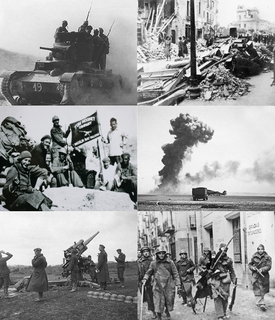
The Spanish Civil War was a civil war in Spain fought from 1936 to 1939 between the Republicans and the Nationalists. Republicans were loyal to the left-leaning Popular Front government of the Second Spanish Republic, and consisted of various socialist, communist, separatist, anarchist, and republican parties, some of which had opposed the government in the pre-war period. The opposing Nationalists were an alliance of Falangists, monarchists, conservatives, and traditionalists led by a military junta among whom General Francisco Franco quickly achieved a preponderant role. Due to the international political climate at the time, the war had many facets and was variously viewed as class struggle, a religious struggle, a struggle between dictatorship and republican democracy, between revolution and counterrevolution, and between fascism and communism. According to Claude Bowers, U.S. ambassador to Spain during the war, it was the "dress rehearsal" for World War II. The Nationalists won the war, which ended in early 1939, and ruled Spain until Franco's death in November 1975.

Madrid is the capital and most populous city of Spain. The city has almost 3.4 million inhabitants and a metropolitan area population of approximately 6.7 million. It is the second-largest city in the European Union (EU), and its monocentric metropolitan area is the second-largest in the EU. The municipality covers 604.3 km2 (233.3 sq mi) geographical area.
